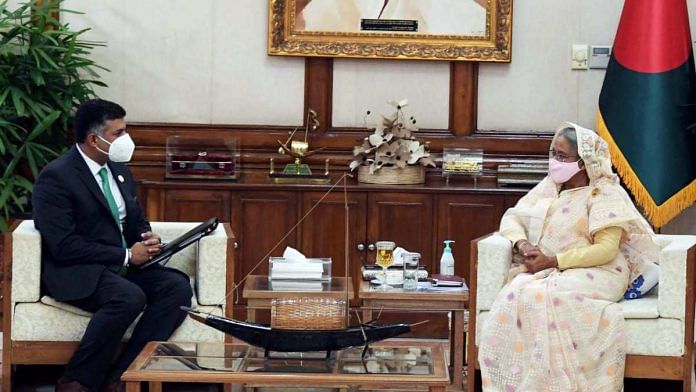
New Delhi: India is “closely monitoring” the recent developments in the bilateral ties between Dhaka and Islamabad, with New Delhi also reminding Bangladesh about the horrors of the 1971 Liberation War.
While India and Bangladesh are preparing for a virtual summit meeting between Prime Minister Narendra Modi and his counterpart Sheikh Hasina, which is going to take place on 17 December, New Delhi is concerned over the growing closeness between Dhaka and Islamabad, sources told ThePrint.
Meanwhile, Indian High Commissioner to Bangladesh Vikram Doraiswami Thursday met Hasina and spoke about Prime Minister Narendra Modi’s “commitment to make India-Bangladesh ties truly transformative”.
Doraiswami tweeted that the “fraternal” India-Bangladesh ties are “rooted in shared sacrifice, equality and respect, derive strength from mutual trust and closest interaction among people”.
Conveying PM@narendramodi's commitment to make 🇮🇳🇧🇩 ties truly transformative, HC @VDoraiswami called on Hon'ble PM, H.E. Sheikh Hasina today
Our fraternal ties rooted in shared sacrifice, equality & respect, derive strength from mutual trust & closest interaction among people pic.twitter.com/66INWLArmS
— India in Bangladesh (@ihcdhaka) December 10, 2020
However, India is now concerned that Pakistan is making rapid inroads in Bangladesh.
According to sources, Pakistan is taking advantage of the fact that Bangladesh had issues with India over the controversial Citizenship Amendment Act (CAA) and the National Register of Citizens (NRC) with the Pakistani “deep state” attempting to create disturbances in the friendly relations between Dhaka and New Delhi.
The sources also said Pakistan is being able to come closer to Bangladesh, despite the stiffness in their ties, with the help of China. However, they added, the relationship will not be able to progress further due to resistance from the Pakistani Army as well as from Bangladesh side.
The matter is expected to come up at the summit meeting where Dhaka is likely to raise the issue of CAA and also push for the development projects funded by India, even though Beijing is also involved in a number of projects there.
‘Never forget, never again’
On 9 December, which is observed as the UN International Day of Victims of Genocide, India called for paying homage to the 3 million people killed and hundreds of thousands of women raped by the Pakistan Army and religious militias in the 1971 Bangladesh Liberation War and said, “never again”.
“Let’s pay homage to 3 million killed & 200,000 or more women raped in erstwhile East Pakistan by Pakistan army & religious militias in 1971 in the most horrific episode in human history… Never again,” tweeted T.S. Tirumurti, India’s Permanent Representative to the UN in New York.
UN International Day of Victims of Genocide on 9 Dec
Let’s pay homage to 3 million killed & 200,000 or more women raped in erstwhile East Pakistan by Pakistan army & religious militias in 1971 in most horrific episode in human history.
Never again @UN_GP_RtoP #PreventGenocide
— PR UN Tirumurti (@ambtstirumurti) December 8, 2020
Retweeting his tweet, Doraiswami said: “Amen to that. Never forget…. and never again.”
Amen to that. #rememberthevictimsof71. Never forget…. and never again.@MEAIndia @albd1971 https://t.co/sFr5dx6b6Z
— Vikram Doraiswami (@VDoraiswami) December 9, 2020
This came days after Pakistan’s High Commissioner to Bangladesh Imran Ahmed Siddiqui called on Prime Minister Hasina on 4 December in a rare gesture. Both sides are also planning to set up a dialogue mechanism between their foreign secretaries.
However, Hasina also reportedly told the Pakistani envoy that the incidents of 1971 “can’t be forgotten”, adding that the “pain will remain forever”.
According to a statement issued by the Pakistan High Commission in Bangladesh: “The two sides agreed to further strengthen the existing fraternal relations between the two countries.”
Modi had lauded Bangladesh
Modi was expected to visit Dhaka in March this year as the country is observing the birth centenary celebrations of Bangabandhu Sheikh Mujibur Rahman, known as ‘Jatir Pita’ or the ‘Father of the Nation’ in Bangladesh. However, he had to cancel the trip due to Covid-19.
“We are all witnessing that how making terror and violence weapons of politics and diplomacy destroys a society and a nation. The world is also watching where the supporters of terror and violence are currently placed and in what state they are, while Bangladesh is scaling new heights,” Modi had said, addressing Bangladesh through a video link on the launch of the birth centenary celebrations of Mujibur Rahman.
Subscribe to our channels on YouTube & Telegram
Why news media is in crisis & How you can fix it
India needs free, fair, non-hyphenated and questioning journalism even more as it faces multiple crises.
But the news media is in a crisis of its own. There have been brutal layoffs and pay-cuts. The best of journalism is shrinking, yielding to crude prime-time spectacle.
ThePrint has the finest young reporters, columnists and editors working for it. Sustaining journalism of this quality needs smart and thinking people like you to pay for it. Whether you live in India or overseas, you can do it here.